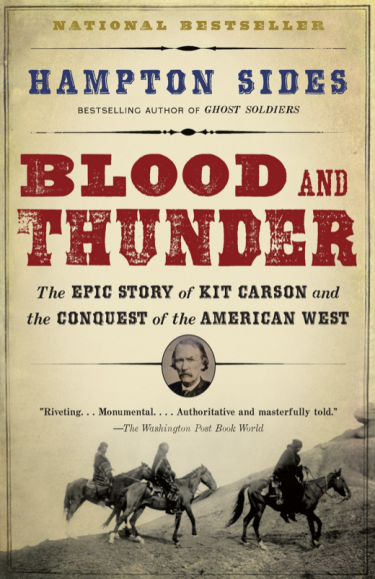Blood and Thunder is riveting history on the half truths of the American West
 I recently finished Blood and Thunder by Hampton Sides and was mightily impressed.
I recently finished Blood and Thunder by Hampton Sides and was mightily impressed.
Not only does the book demystify the Wild Wild West, of which only half of what you heard it true (although the other half is still amazingly true!), the book clarifies the always complicated Indian-American relations as the nation expanded west to California. That understand is powerful enough.
On top of that, however, Blood and Thunder is an epic telling of the heroic Kit Carson, who scouted the west for early pioneers and settlers to eventually follow. For its well researched, balanced, and shocking reporting, I award it five stars out of five.
These were some of my favorite passages:
- From an early age, Carson learned an important practical truth of frontier life—that there was no such thing as “Indians,” that tribes could be substantially and sometimes violently different from one another, and that each group must be dealt with separately, on its own terms.
- The trappers murdered Indians in countless kill-or-be-killed scenarios, and some made a practice of hammering brass tacks into the stocks of their rifles for every native dispatched. But their greater slaughter was unwitting: As the forerunners of Western civilization, creeping up the river valleys and across the mountain passes, the trappers brought smallpox and typhoid, they brought guns and whiskey and venereal disease, they brought the puzzlement of money and the gleam of steel. And on their liquored breath they whispered the coming of an unimaginable force, of a gathering shadow on the eastern horizon, gorging itself on the continent as it pressed steadily this way.
- In a sense, the Navajo were the most “American” of the American Indians: They were immigrants, improvisationists, mongrels. They were mobile and restless, preferring to spread out as far as possible from one another over large swatches of country while still remaining within the boundaries of their land. They inhaled the essence of other cultures, taking what they liked and adapting it to their own ends.
- They had become smitten with the notion of American exceptionalism. (My thoughts: You are what you believe. Americans then believed and still do that they are exceptional, and that unified belief makes them exceptionally confident and capable in an almost non-tyrannical way that history may have never seen. The most democratic empire ever?)
- In general, it was said that the Mexicans were better at stealing people, and the Navajos were better at stealing animals. Whatever the case, the attacks and reprisals were simply part of the grim metronome of life, swinging with the same logic of a feud.
- The Army of the West had come as far as it could go, as far as the cardinal direction in its name would take it. Two thousand miles, from Fort Leavenworth, Kansas, to the bitter end of the continent—there had never been a march like it in American history.
- It is impossible to exaggerate how miserably slow frontier communications were in the 1840s. A soldier’s wife in St. Louis was much like a whaler’s wife in Boston—she said good-bye to her beloved as he set sail on an ocean of land and then she accepted the voids of silence, the hard nights of not knowing, as the weeks and months became years.
- “It seems anomalous to me that a nation living in such miserably constructed mud lodges should, at the same time, be capable of making, probably, the best blankets in the world!”
- Carson believed that most of the Indian troubles in the West were caused, as he once flatly put it, “by aggressions on the part of whites.” Most of the raids, by Utes and other tribes, were visited upon the settlements only out of desperation—“committed,” he argued, “from absolute necessity when in a starving condition.”
- Most of them were guilty of nothing more than being Navajo. The errant young men responsible for most of the raids represented but a small percentage of the tribe. Yet now the many would pay for the malefactions of the few; now all the Diné would finally suffer for the trouble caused by its most incorrigible members… It was an odd reversal of fate: Now the Navajos had become victims of the same menace they had once so successfully visited upon the New Mexicans.
- “Let me tell you what we think. You begin when you are little to work hard. After you get to be men, you build big houses, big towns, and everything else in proportion. Then, after you have got them all, you die and leave them behind. Now, we call that slavery. You are slaves from the time you begin to talk until you die; but we are free as air… We will not be slaves; nor will we send our children to your schools, where they only learn to become like yourselves.”
- Carleton was not optimistic about the future of American Indians. Reservations might slow their demise, but ultimately it was their destiny to die out in the divine battle for survival of the fittest. “In their appointed time,” Carleton wrote, “God wills that one race of men—as in the races of lower animals—shall disappear off the face of the earth and give place to another race, and so on in the Great Cycle traced out by Himself, which may be seen but has reasons too deep to be fathomed by us. The races of the Mammoths and Mastodons, and the great Sloths, came and passed away: The Red Man of America is passing away!”
- “Beauty before us. Beauty behind us. Beauty around us. In beauty we walk.” (Navajo song as they returned to their ancestral lands of Arizona, Utah, and New Mexico)
